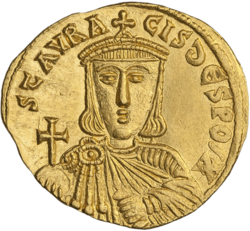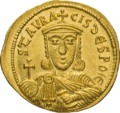Staurakios facts for kids
Quick facts for kids Staurakios |
|
|---|---|
| Emperor of the Romans | |

Staurakios as co-emperor on a gold solidus
|
|
| Byzantine emperor | |
| Reign | 26 July – 2 October 811 |
| Coronation | 25 December 803 |
| Predecessor | Nikephoros I |
| Successor | Michael I |
| Alongside | Nikephoros I (803 – 811) |
| Born | Early 790s |
| Died | 11 January 812 |
| Burial | Monastery of Braka |
| Consort | Theophano of Athens |
| Dynasty | Nikephorian |
| Father | Nikephoros I |
Staurakios (Greek: Σταυράκιος, romanized: Staurákios; Latin: Stauracius, early 790s – 11 January 812) was a Byzantine emperor who ruled for a very short time. He was emperor for only 68 days, from July 26 to October 2, 811. This makes his reign one of the shortest in Byzantine history.
Staurakios was born in the early 790s. His father was Nikephoros I, who became emperor in 802. Nikephoros took the throne from Empress Irene. In 803, Nikephoros made Staurakios a co-emperor. This meant Staurakios would rule alongside his father and be next in line for the throne.
In 807, Staurakios married Theophano of Athens. She was related to the former Empress Irene. This marriage helped make Nikephoros's rule seem more legitimate.
Contents
Becoming Emperor
The Battle of Pliska
In 811, Staurakios joined his father, Emperor Nikephoros I, in a war against the Bulgarian Khanate. The Byzantine army attacked the Bulgarian capital, Pliska. They won some early battles. However, the Bulgarian leader, Khan Krum, trapped the Byzantine army in a valley.
On July 26, 811, the Battle of Pliska began. It was a terrible defeat for the Byzantines. Much of their army was destroyed. Emperor Nikephoros I was killed in the battle. Staurakios was also badly hurt, suffering a severe spine injury.
Taking the Throne
After the battle, the remaining Byzantine soldiers carried Staurakios back to Constantinople. Even though he was seriously injured, he was declared emperor. This was done to keep the line of succession clear. However, his injuries were so bad that people wondered if he would live.
Staurakios was paralyzed from the waist down. This made it very difficult for him to rule. Important leaders in the empire began to discuss who should be the next emperor.
Challenges as Emperor
Debate Over a Successor
Because Staurakios was so ill and had no children, there was a big debate about who would rule after him. His sister, Prokopia, wanted her husband, Michael Rhangabe, to become emperor. Michael was a high-ranking official.
Staurakios's wife, Empress Theophano, also hoped to become empress. She might have wanted to rule alone, like her relative Empress Irene. Staurakios himself thought about making Theophano his successor. He also considered a different idea, but it was not fully understood.
The leaders of the empire, including the Patriarch Nikephoros I, did not want another empress ruling alone. They remembered the problems during Empress Irene's rule. They decided to support Michael Rhangabe.
Abdication and Death
On October 1, 811, a plan was made to make Michael emperor. The next day, October 2, Michael was publicly declared emperor in the Hippodrome of Constantinople. He was crowned by Patriarch Nikephoros.
When Staurakios heard this, he quickly gave up his throne. He was afraid he would be executed if he didn't. He became a monk and went to live in a monastery.
Staurakios lived for about three more months. He died on January 11, 812. He was buried in the Monastery of Braka. Some people at the time said that his sister, Prokopia, might have poisoned him. However, others believed he died from his injuries, possibly from an infection called gangrene.
Legacy
Staurakios's reign was very short, lasting just over two months. Because of this, he didn't have much time to make a big impact on the Byzantine Empire. He is mostly remembered for his severe injuries from the Battle of Pliska and the quick end to his rule. He remains a brief and somewhat mysterious figure in history.
Images for kids
-
Staurakios (above) retreats with his remaining forces, while Nikephoros I (below) is captured by the Bulgarians. Miniature from the 14th century Manasses Chronicle.
 | Delilah Pierce |
 | Gordon Parks |
 | Augusta Savage |
 | Charles Ethan Porter |







